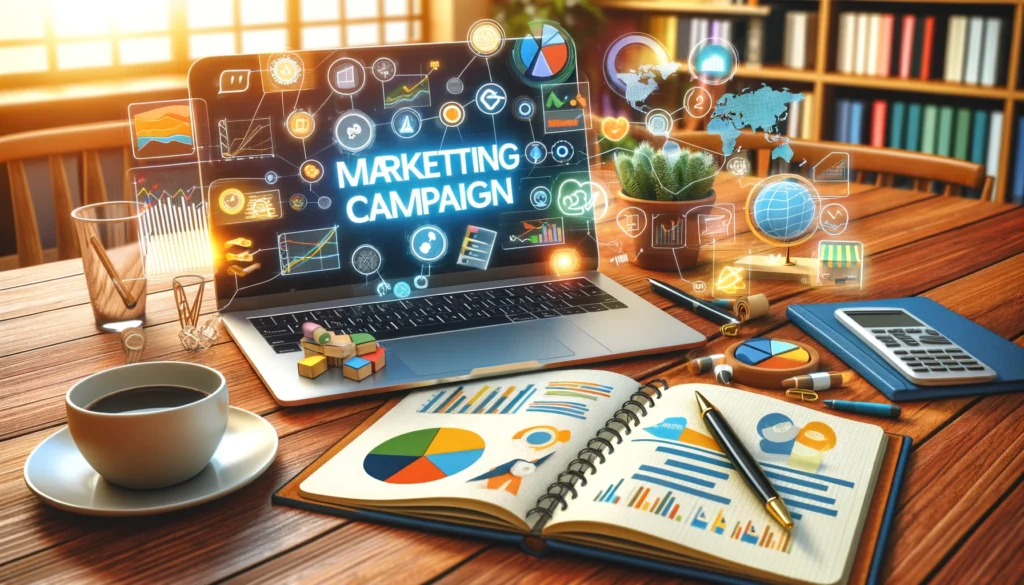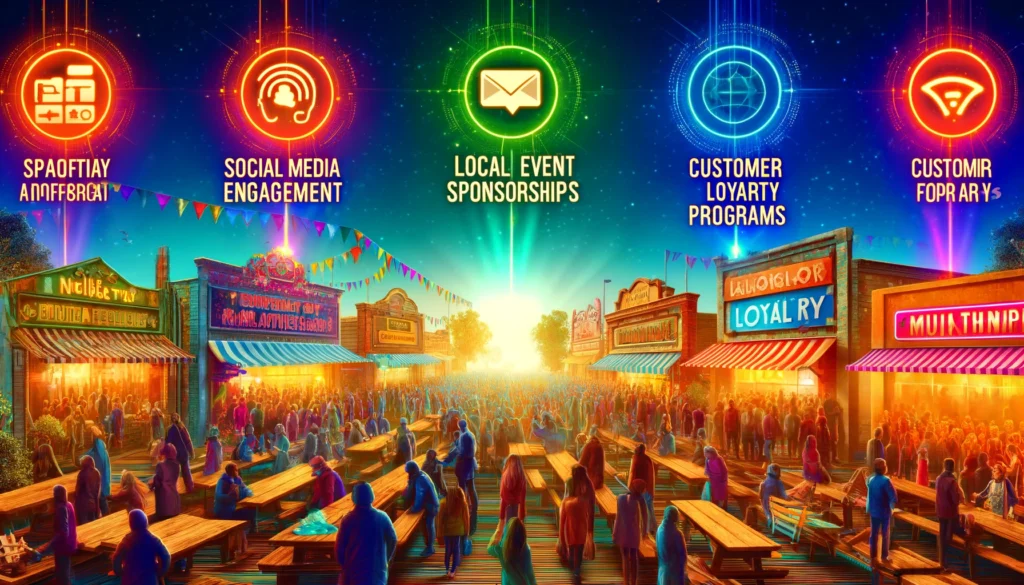68% Of Marketers Rated Paid Advertising As Extremely Important To Their Entire Digital Marketing Strategy.
Nowadays, building a strong online presence is the main goal of small business marketing, but there are other avenues you can take. Every small business will have various needs for determining how to contact new consumers, stay in touch with old ones, and build lasting connections with purchasers.
These differences include goals, budget, target audience, and product. Optimizing your marketing plan is one of the keys to success, even if you are just getting started. Continue reading to learn some of the most effective small-company marketing tactics.

What is a Marketing Campaign?
A marketing campaign is a promotional plan (or group of techniques) aimed at achieving a certain marketing objective. The most effective advertisements frequently revolve around direct messaging to current and potential clients.
Marketing initiatives aim to elicit a strong response from potential customers and fortify ties with current clients. A compelling call to action (CTA) is therefore essential. Additionally, you want to send out tailored, timely messages that have a strong emotional connection with the particular clients you are dealing with.
A lot of people think spam is what marketing campaigns are. Direct marketing is far from an irritating method of the past if you know how to modify it for the current environment. Rather, tailoring your message to their interests is a terrific method to increase consumer interaction and build relationships with future customers.
Types of Marketing Campaigns
Different marketing campaigns are available for local businesses, each with variants to suit their unique goals and resources. Nonetheless, the majority fall into one of these categories:
- Acquisition marketing campaign: Strives to attract new customers and turn leads into devoted patrons.
- Social media campaign: This campaign uses social media to raise conversion rates, website traffic, and brand exposure.
- Paid advertising campaign: Reaches consumers through paid marketing, typically online.
- User-generated content campaigns: Focus on material created and driven by customers around your brand.
- Brand awareness campaign: aims to raise awareness of the brand (brand strategy, direction shift, etc.)
- Affiliate marketing campaigns: It involves placing links or ads for your business on external websites in exchange for a commission calculated per click.
- Email marketing campaign: Makes use of email to accomplish a marketing goal.
- Content marketing campaign: Provides pertinent assets to target particular client categories.
- Product marketing campaign: Encourages the acquisition of a product.
- Referral marketing campaign: Uses rewards to encourage consumers to recommend friends and family.

Different Marketing Campaign Channels
As we previously discussed, there are a variety of ways that marketing efforts can reach consumers, including online, in-store, and even at home. Think about using these strategies for your upcoming campaign:
Email Marketing
Indeed, email has existed for a very long time. However, it’s still among the least expensive and most successful marketing strategies. Effective email marketing can be inexpensive, with returns estimated to be about $36 for every $1 spent.
To make the most of this marketing channel, develop a plan that includes the following details:
- Frequency: Weekly, bimonthly, monthly, or at a different interval. Additionally, allow recipients to select which emails from your company they want to receive and how often.
- Campaign type: The most appropriate email campaign type will depend on the information you wish to offer. Newsletters, drip marketing, product updates, reminders for abandoned carts, and discount notifications are a few examples.
- Email service provider: Well-known marketing software providers include MailChimp, HubSpot, ActiveCampaign, and Drip.
- Creating an email list: Use your current clientele, leads generated by your website or social media pages, and in-store sign-up forms.
Typically, this marketing tactic entails bulk emailing prospective, existing, and past clients with information about special offers, promotions, and business updates. Email marketing is a highly adaptable approach since you can alter every aspect of the message to suit your brand and the information you wish to deliver.
Targeted emails tailored to the recipient’s individual needs can be delivered to designated client groups. Email addresses can be gathered in several ways, such as through website sign-ups, contests, or incentives and discounts.

Social Media Marketing
With good reason: social media marketing is very popular right now. Businesses can reach potential clients worldwide by continuously attracting new followers and purchases by using social media review sites such as Instagram, TikTok, Twitter (X), and Facebook (Meta). Even though it may seem overwhelming, pay attention to what is popular because this marketing approach isn’t going away anytime soon.
A survey found that 42% of Americans utilize social media to locate the small businesses they support. Establishing business profiles on well-known websites such as Facebook review, Instagram, TikTok, Twitter, YouTube, Pinterest, LinkedIn, and others can facilitate customer discovery and offer a chance to interact with existing clients.
If you’re new to social media marketing, pick one platform to work with right away and learn how to make the most of it. This could entail increasing followers, collaborating with influencers, investing in sponsored advertisements, making reels, or publishing on a daily basis.
Here are some tips for managing your social media strategy:
- Post high-resolution pictures of your merchandise, staff behind-the-scenes photos, video stories, and live discussions about your company.
- Provide information about forthcoming events and unique offers only available to you.
- Make time to reply to messages and comments.
- To enable you to republish their online reviews, ask clients to post about their interactions with your company on social media and mention your business account.
Whatever you choose to accomplish, involvement is going to be crucial. Consumers want to feel that the companies they do business with are concerned about their requirements, open to hearing their thoughts, and will promptly address any queries or issues.
Content Marketing
One tactic small businesses can use to build and maintain client connections is content marketing. Its goal is to attract visitors and pique their interest in learning more about your company by offering pertinent, educational, amusing, and informative content. Using content marketing carefully and making it useful for your target audience is the key to success. It should always be informative and engaging rather than overpowering or harsh.
The ultimate aim of content marketing is to establish your authority as a provider of any good or service. This is accomplished by drawing in and holding onto customers’ attention, a challenging task in today’s hectic society. When implemented properly, content marketing may follow a customer from the time they begin idly browsing to when they decide to purchase from your company.

Mobile Marketing
It should go without saying that everyone is nearly always staring at their phone. This receptive group can be reached quite effectively with mobile marketing, frequently without their knowledge. Businesses may tailor their marketing strategies to mobile customers using search history and location monitoring tools.
Reaching more potential customers daily, wherever they may be, is possible when you place advertisements on social media or incorporate them into web pages. Generally speaking, mobile marketing is far less expensive and easier to start up than traditional advertising.
The first thing you should do is ensure that your small business website is fully mobile-friendly for everything from browsing to making purchases. After that is established, you may experiment with other choices, such as in-app promos, location-based advertisements, and short messaging service (SMS) messages to your clients.
Paid Advertising
Online paid advertising comes in a variety of forms. Typical techniques include the following:
- Purchasing advertising space on social media sites, including LinkedIn, Facebook, Instagram, and Twitter.
- Funding a podcast.
- Collaborating with an influencer to promote your goods or services on their channels.
- Using pay-per-click advertising, you, up to a preset budget, are charged a fee each time a user clicks on your web advertisement.
Conventional Marketing
Traditional marketing is no longer nearly as popular as once, yet it may still play a significant role in your small business marketing plan. Any offline marketing is referred to as traditional marketing, and it might be a good choice depending on what you are selling and your target market.
Advertisements in magazines and newspapers, billboards, direct mail, radio, and television are examples of traditional marketing. These marketing channels are still useful and relevant in the age of electronics. The expense is usually the largest drawback, though, as traditional marketing is nearly always more expensive than digital initiatives.

Experiential Marketing
Experiential marketing aims to build brand recognition and brand loyalty rather than just selling products. The intention is to give customers a pleasant brand experience that will motivate them to recommend you to their friends, family, coworkers, and social media followers.
Events such as tournaments, concerts, pop-up stores, freebies, tours of your facilities, workshops, tutorials, and competitions are all included under the category of experiential marketing.
How to Create a Perfect Small Business Marketing Strategy?
Developing a long-term plan that will help you comprehend your goals, build your authority, attract more clients, and provide an idea of where you stand about marketing outcomes is all part of creating a small business marketing strategy.
It’s a functioning blueprint that must be modified and updated as your company expands rather than a one-time project. This is the way to get going:
Set Your Objectives
There’s a reason you launched your small business, but when was the last time you reviewed your objectives? The first phase examines your precise, quantifiable objectives—not just your lofty aspirations. Pay attention to the numbers and identify the short- and long-term goals. They can be large or small if they are well-defined.
Analyze Your Current Activities
Next, carefully examine your present marketing initiatives to ascertain what is and is not effective. Enumerate all of the tactics you have employed and assign a success rating to each. Check each one’s costs vs. results to identify which areas have yielded a strong return on investment for your company.
Understand Your Target Customer
You are attempting to contact who? What kind of person is your target market? Invest time getting to know these folks, including their preferred payment methods, place of residence, and shopping habits. By becoming as familiar as possible with this audience, you can decide which marketing initiatives are most likely to be effective.
Select Your Options
Upon compiling all the required data, it’s time to select your marketing tactics. After starting with one or two that have previously proven successful for your small business, choose a new one to test out for six months. Remember that not every marketing strategy works for everyone, so there will always be times when you need to experiment and adjust your plan.
3 Best Marketing Strategies To Grow Your Small Business
- Capitalize on Google’s Local Offerings
Google is the most popular search engine and offers many services that can benefit your small business. In 2015, Google launched Let’s Put Our Cities on the Map as part of an attempt to get local businesses online. According to the BCG Report, The Connected World, businesses with an online presence expand at a rate of forty percent quicker than those without. It’s time to get on the bandwagon if you missed the boat!
Setting up a Google My Business account allows you to manage the details about your company, including its website, phone number, address, and operating hours. Thanks to the new local search ads, your company can now appear on the Google Maps app or website.
- Champion One Social Media Channel
Social media may be challenging and annoying. Particularly when juggling Twitter, Google+, Instagram, Pinterest, Facebook reviews, LinkedIn, etc. It’s difficult to determine if it functions at all! While being present on several channels is fantastic, I’ve discovered that focusing on the one where your clients are most active works best.
Invest more time on Instagram (which is also easily shared on Facebook) if, for instance, your consumers are frequently tagging your location or handling Instagram posts but infrequently retweeting you on Twitter.
Given that Pinterest has a far longer half-life than any other channel, creative designers should consider it.
- Survey, Listen, and Learn
Look for criticism, as top businesses are continually improving. After completing a service, ask your customer for online reviews on their experience. Offer a discount to email subscribers who complete a survey or keep printed surveys and pens in your store.
If you’re feeling fancy, have a customer complete a survey on her phone or tablet to receive a discount before purchasing. The internet review is beneficial in two ways: it can inform your company’s best practices, resulting in useful testimonials, and it can reveal areas for improvement.
Conclusion
Finally, it does not matter which marketing methods are most popular. What is important is that you find the proper fit for your specific business. You might sell the best product ever created, but your company will never reach its full potential if no one has heard of it. Developing a marketing campaign playbook is critical to your small business’s success.
Online reviews play a pivotal role in this context, serving as a critical element in your marketing playbook. In today’s digital age, consumers increasingly rely on online reviews to make informed purchasing decisions. A positive review can significantly boost your product’s visibility and credibility, while a negative one can deter potential customers. Thus, actively managing and incorporating online reviews into your marketing strategy can be a game-changer, offering an authentic perspective on your product that can attract a broader audience.







